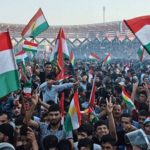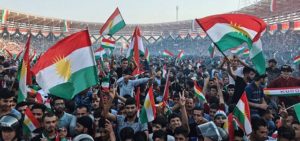Sunday Nov. 3: Livestream Dialogue on Kurdish Self-Determination and Socialism

 As Turkey starts a full-scale military invasion of northern Syria to crush the Kurdish struggle for self-determination and push Syrian refugees into a zone under its control, it has become clear that no global or regional power is interested in the emancipation of the Kurds or any other peoples of the region. The current ominous situation demands a new kind of dialogue between socialists in the Middle East and North Africa region. There are over 35 million Kurds in Turkey, Syria, Iraq and Iran. The Kurdish struggle for self-determination has been an integral part of the history of the Modern Middle East. Yet authoritarian capitalist and imperialist powers have always used racism, ethnic divisions, sexism and the pull of capital to prevent the creation of a united regional revolutionary and socialist emancipatory movement.
As Turkey starts a full-scale military invasion of northern Syria to crush the Kurdish struggle for self-determination and push Syrian refugees into a zone under its control, it has become clear that no global or regional power is interested in the emancipation of the Kurds or any other peoples of the region. The current ominous situation demands a new kind of dialogue between socialists in the Middle East and North Africa region. There are over 35 million Kurds in Turkey, Syria, Iraq and Iran. The Kurdish struggle for self-determination has been an integral part of the history of the Modern Middle East. Yet authoritarian capitalist and imperialist powers have always used racism, ethnic divisions, sexism and the pull of capital to prevent the creation of a united regional revolutionary and socialist emancipatory movement.
Join us for a dialogue between Kurdish Turkish, Kurdish Iranian, Syrian Swiss socialists to discuss the following questions:
1. What is the state of the struggle for Kurdish self-determination in Syria, Turkey, Iraq and Iran? In each case, how is this struggle related to other progressive struggles against the authoritarian regime of each particular country, other authoritarian regimes and forces in the region, as well as regional and global imperialist powers? What have been the contradictions and the problems?
2. Kurdish women have been very active in Rojava and have also been in the forefront of women’s struggles in Turkey. What have been the high points and the limitations of Kurdish women’s participation? How are Kurdish socialist feminists theorizing women’s emancipation in ways that go beyond the patriarchy and relations of domination within the various Kurdish parties?
3. How are Kurdish socialists envisioning the relationship between Kurdish self-determination and international revolutionary socialism? What can we still learn from Marx, Lenin and Fanon?
4. What kind of regional and global solidarity with the Kurdish struggle for self-determination is needed now?
Speakers:
Nazan Üstündağ received her Ph.D. from the sociology department at Indiana University Bloomington in 2005. Between 2005 and 2018, she has been an Assistant Professor at Boğaziçi University, Department of Sociology. Currently, she is receiving a joint fellowship from Academy at Risk and IIE-Scholar Rescue Fund, and is affiliated with the Forum for Transregional Studies. Üstündağ has worked as a columnist in the journal Nokta and the newspaper Özgür Gündem and her opinion pieces appeared in websites such as Bianet, T24 and Jadaliyya. Üstündağ is a founding member of Women for Peace and Academics for Peace. Currently, she is working on a book manuscript on the cosmology of the Kurdish Movement based on three women figures: the mother, the politician and the guerilla.
Kamran Matin is senior lecturer in International Relations at Sussex University, UK, where he teaches international history, international theory, and Middle East politics. He is the author of Recasting Iranian Modernity: International Relations and Social Change (Routledge, 2013) and co-editor of Historical Sociology and World History: Uneven and Combined Development over the Longue Durée (Rowman & Littlefield International, 2016). Matin is currently working on a manuscript on ‘Kurdish communism in post-revolutionary Iran’. He is the co-editor of Palgrave’s Minorities in West Asia and North Africa (MWANA) series.
Joseph Daher teaches at Lausanne University, Switzerland and is a part time affiliate professor at the European University Institute, Florence (Italy). He is the author of Syria after the Uprisings (Pluto, 2019) and Hezbollah: The Political Economy of the Party of God (Pluto, 2016). He is the co-editor of Penser l’emancipation (La Dispute, 2013) and founder of the blog Syria Freedom Forever.
Moderator:
Frieda Afary
Philosophy M.A. She is a librarian, translator, producer of Iranian Progressives in Translation, and member of the Alliance of Middle Eastern and North African Socialists. She has published articles in English and Persian on the Middle East, Marx’s Capital, Socialist Feminism, and Marxist critiques of state capitalism.
6 p.m. – 8:30 p.m. Geneva time
Sponsored by the Alliance of Middle Eastern and North African Socialists
To listen to the livestream dialogue, go to:
https://www.facebook.com/events/434609033838570/
Originally posted on the Alliance of Middle Eastern and North African Socialists website.